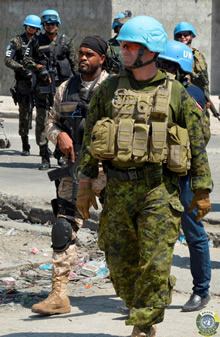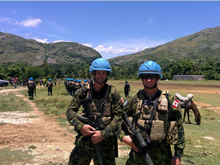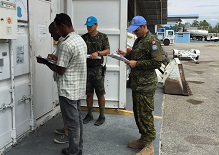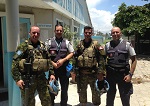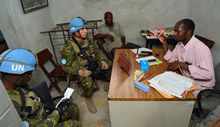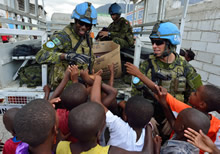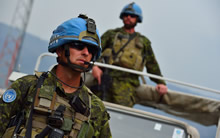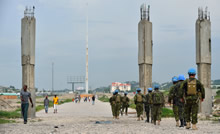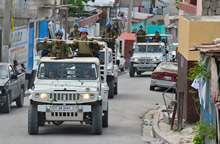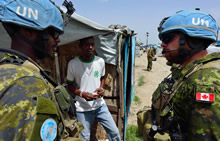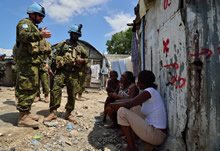Operation HAMLET
Related Links
Operation HAMLET was the Canadian Armed Forces’ participation in the United Nations Stabilization Mission in Haiti, commonly known by its French name, Mission des Nations Unies pour la stabilisation en Haïti, or the acronym MINUSTAH.
This operation ran from May 22, 2004, until October 15, 2017.
Operation HAMLET was the military component of a Canadian whole-of-government engagement with Haiti that also included:
- Global Affairs Canada;
- the Correctional Service of Canada; and
- the Royal Canadian Mounted Police.
Task Force Port-au-Prince
Task Force Port-au-Prince was the team deployed on Operation HAMLET. It comprised a small team of staff officers serving in senior appointments at MINUSTAH’s military headquarters. The Task Force Commander served as Chief of Staff to the MINUSTAH Force Commander.
Mission context
The conflict
In February 2004, a revolt against the government of President Jean-Bertrand Aristide began in Gonaïves on the south shore of Haiti’s northern peninsula. Armed opposition quickly spread through the north and, by the end of the month, threatened Port-au-Prince, the capital. On February 29, 2004, Mr. Aristide left the country and Boniface Alexandre, president of the Supreme Court of Haiti, was sworn in as an interim President of Haiti. Mr. Alexandre immediately made an urgent appeal to the United Nations for help in restoring peace and security.
MINUSTAH and its mandate
U.N. Security Council Resolution 1529 of February 29, 2004 authorized the deployment in Haiti of a Multinational Interim Force, led by the United States, for 90 days, and declared that a U.N. stabilization force would follow to facilitate the peaceful implementation of a constitutional process.
MINUSTAH took the field under Chapter VII of the United Nations Charter by U.N. Security Council Resolution 1542 of April 30, 2004 with a mandate to:
- Restore a secure and stable environment;
- Promote the political process;
- Strengthen the institutions and rule-of-law structures of the Government of Haiti; and
- Promote and protect human rights.
Over the years, this mandate had been expanded to add:
- Disarmament, reintegration and reconciliation of insurgents;
- Support to Haiti’s political and electoral processes;
- Reform of the judiciary, the police and the corrections system;
- Public safety and border security; and
- Assistance to reconstruction efforts after the earthquake of January 12, 2010.
The mission’s initial term of six months was repeatedly extended. The mission came to a close on October 15, 2017.
Canadian Armed Forces operations in Haiti
Since 1988, when a military coup ended the presidency of Leslie-François Manigat, Canada has been an active participant in international peace-support, stabilization and humanitarian operations in Haiti. During the same period, the Canadian Armed Forces have also planned four and launched three non-combatant evacuation operations related to unrest in Haiti.
The initial rotation of Task Force Port-au-Prince consisted of two staff officers who deployed from Canada on May 22, 2004 to join MINUSTAH Headquarters at its stand-up. The task force grew to three in 2005, and to five by 2010. For a year after the devastating earthquake of January 12, 2010, Task Force Port-au-Prince was increased to 10 personnel, reverting to five during the summer of 2011.
On January 12, 2010, a 7.0 magnitude earthquake struck the southern peninsula of Haiti. It was followed by more than 50 severe aftershocks. The earthquake caused significant loss of life and injuries, and it destroyed buildings, roads and infrastructure throughout the region, especially in the cities of Port-au-Prince, Léogâne and Jacmel.
The Government of Haiti appealed for help, and the international community immediately mounted an extensive long-term humanitarian operation. The Canadian Armed Forces contributed a major joint task force under Operation HESTIA.
Brazilian Battalion
From June to November 2013, a platoon of 34 personnel from the Canadian Army operated within a Brazilian Battalion to support the MINUSTAH mandate. Working with Brazilian personnel, the Canadian Armed Forces members assisted Haitian security and stability efforts.
The Canadian Armed Forces platoon was comprised of personnel from 5 Canadian Mechanized Brigade Group in Valcartier. The platoon completed language and peace-support training in Brazil prior to this one-time deployment.
Their primary task was to conduct patrols of their area of responsibility and create a visible military presence in Haitian communities. They also provided a link between the United Nations and the local population and were able to assist in improving living conditions for Haitians. The fact that the platoon spoke French helped them gain the trust of the local population.
As part of the growing relationship between Canada and Brazil, the partnership served to increase military-to-military cooperation. It also supported the Government of Canada’s objective to build a more prosperous, secure and democratic hemisphere.
Participation in MINUSTAH
In March 2004, under Operation HALO, Task Force Haiti (comprising some 500 personnel, including a rifle company from the 2nd Battalion, The Royal Canadian Regiment, six CH-146 Griffon tactical helicopters and a Civil-Military Cooperation detachment) deployed to serve with the Multinational Interim Force. Canada was asked to extend its commitment through the transition to the U.N. stabilization mission; consequently, on June 25, 2004, the soldiers and airmen of Task Force Haiti put on the U.N. blue beret in a ceremonial parade in Port-au-Prince. “Cease ops” came on July 31, 2004, when the first contingents of MINUSTAH troops were in place, and the main body of Task Force Haiti was back in Canada by August 3, 2004. The last member of Task Force Haiti’s rear party redeployed on August 17, 2004.
Peace-support and stabilization operations
- Operation HAMLET: United Nations Stabilization Mission in Haiti (MINUSTAH), May 22, 2004 to October 15, 2017.
- Operation HALO:
- MINUSTAH, June 25 to August 2, 2004
- Multinational Interim Force, February 29 to July 31, 2004
- Operation COMPLIMENT: United Nations Civilian Police Mission in Haiti (MIPONUH), January 1 1998 to March 16, 2000
- Operation CONSTABLE: United Nations Transition Mission in Haiti (UNTMIH), July 30 to November 30, 1997
- Operation STABLE: United Nations Support Mission in Haiti (UNSMIH), October 1, 1996 to July 31, 1997
- Operation STANDARD: UNSMIH, June 28 to September 30, 1996
- Operation FORWARD ACTION, Multinational Force (MNF): October 18, 1993 to September 29, 1994
- Operation CAULDRON: United Nations Mission in Haiti (UNMIH), October 1 to 15, 1993
- Operation HERITAGE: United Nations Observer Group for the Verification of the Elections in Haiti
- (ONUVEH): November 10, 1990 to February 7, 1991
Non-combatant evacuation operations
- Operation PRINCIPAL: February 28 to March 3, 2004
- Operation DIALOGUE: September 1 to October 12, 1994
- Operation ESCORT: November 1, 1991 to March 30, 1992
- Operation BANDIT: January 5 to February 9, 1988
Humanitarian operations
- Operation HESTIA: January 12 to May 31, 2010
- Operation HORATIO: World Food Programme, September 10 to 27, 2008
- Haiti 2004–4: December 20 to 21, 2004
- Haiti 2004–3: October 28 to 29, 2004
- Haiti 2004–2: October 15 to 16, 2004
- Haiti 2004–1: September 22 to 28, 2004
- Haiti 1999: December 1, 1999
- Haiti 1989: January 1 to October 30, 1989
- Haiti 1963: May 15 to 24, 1963
Whole-of-government sustainment operations
- Operation HUMBLE: May 24 to 31, 2001
Links
Government of Canada
International missions
- United Nations Stabilization Mission in Haiti (United Nations)
- Mission des Nations unies pour la stabilisation en Haïti (MINUSTAH)

